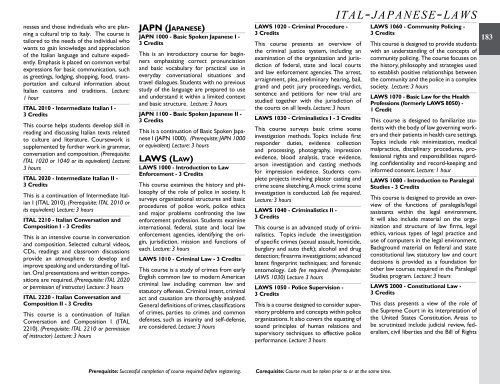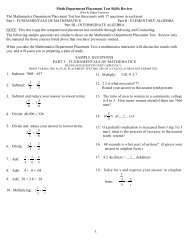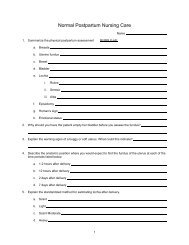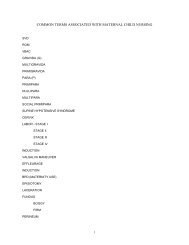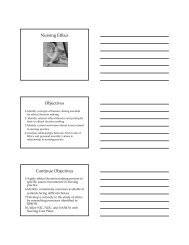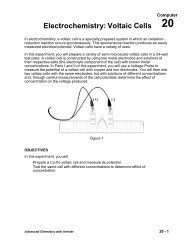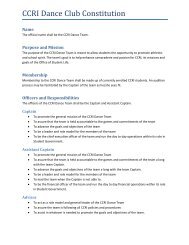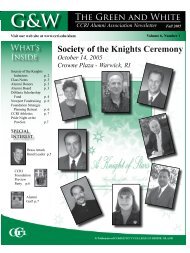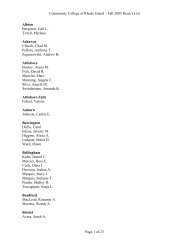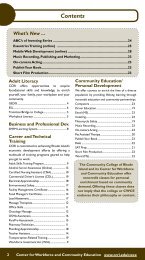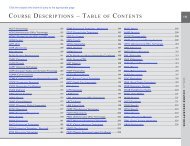Course Descriptions - Community College of Rhode Island
Course Descriptions - Community College of Rhode Island
Course Descriptions - Community College of Rhode Island
Create successful ePaper yourself
Turn your PDF publications into a flip-book with our unique Google optimized e-Paper software.
nesses and those individuals who are planning<br />
a cultural trip to Italy. The course is<br />
tailored to the needs <strong>of</strong> the individual who<br />
wants to gain knowledge and appreciation<br />
<strong>of</strong> the Italian language and culture expediently.<br />
Emphasis is placed on common verbal<br />
expressions for basic communication, such<br />
as greetings, lodging, shopping, food, transportation<br />
and cultural information about<br />
Italian customs and traditions. Lecture:<br />
1 hour<br />
ITAL 2010 - Intermediate Italian I -<br />
3 Credits<br />
This course helps students develop skill in<br />
reading and discussing Italian texts related<br />
to culture and literature. <strong>Course</strong>work is<br />
supplemented by further work in grammar,<br />
conversation and composition. (Prerequisite:<br />
ITAL 1020 or 1040 or its equivalent) Lecture:<br />
3 hours<br />
ITAL 2020 - Intermediate Italian II -<br />
3 Credits<br />
This is a continuation <strong>of</strong> Intermediate Italian<br />
I (ITAL 2010). (Prerequisite: ITAL 2010 or<br />
its equivalent) Lecture: 3 hours<br />
ITAL 2210 - Italian Conversation and<br />
Composition I - 3 Credits<br />
This is an intensive course in conversation<br />
and composition. Selected cultural videos,<br />
CDs, readings and classroom discussions<br />
provide an atmosphere to develop and<br />
improve speaking and understanding <strong>of</strong> Italian.<br />
Oral presentations and written compositions<br />
are required. (Prerequisite: ITAL 2020<br />
or permission <strong>of</strong> instructor) Lecture: 3 hours<br />
ITAL 2220 - Italian Conversation and<br />
Composition II - 3 Credits<br />
This course is a continuation <strong>of</strong> Italian<br />
Conversation and Composition I (ITAL<br />
2210). (Prerequisite: ITAL 2210 or permission<br />
<strong>of</strong> instructor) Lecture: 3 hours<br />
jApn (jApAneSe)<br />
JAPN 1000 - Basic Spoken Japanese I -<br />
3 Credits<br />
This is an introductory course for beginners<br />
emphasizing correct pronunciation<br />
and basic vocabulary for practical use in<br />
everyday conversational situations and<br />
travel dialogues. Students with no previous<br />
study <strong>of</strong> the language are prepared to use<br />
and understand it within a limited context<br />
and basic structure. Lecture: 3 hours<br />
JAPN 1100 - Basic Spoken Japanese II -<br />
3 Credits<br />
This is a continuation <strong>of</strong> Basic Spoken Japanese<br />
I (JAPN 1000). (Prerequiste: JAPN 1000<br />
or equivalent) Lecture: 3 hours<br />
lAwS (lAw)<br />
LAWS 1000 - Introduction to Law<br />
Enforcement - 3 Credits<br />
This course examines the history and philosophy<br />
<strong>of</strong> the role <strong>of</strong> police in society. It<br />
surveys organizational structures and basic<br />
procedures <strong>of</strong> police work, police ethics<br />
and major problems confronting the law<br />
enforcement pr<strong>of</strong>ession. Students examine<br />
international, federal, state and local law<br />
enforcement agencies, identifying the origin,<br />
jurisdiction, mission and functions <strong>of</strong><br />
each. Lecture: 3 hours<br />
LAWS 1010 - Criminal Law - 3 Credits<br />
This course is a study <strong>of</strong> crimes from early<br />
English common law to modern American<br />
criminal law including common law and<br />
statutory <strong>of</strong>fenses. Criminal intent, criminal<br />
act and causation are thoroughly analyzed.<br />
General definitions <strong>of</strong> crimes, classifications<br />
<strong>of</strong> crimes, parties to crimes and common<br />
defenses, such as insanity and self-defense,<br />
are considered. Lecture: 3 hours<br />
LAWS 1020 - Criminal Procedure -<br />
3 Credits<br />
This course presents an overview <strong>of</strong><br />
the criminal justice system, including an<br />
examination <strong>of</strong> the organization and jurisdiction<br />
<strong>of</strong> federal, state and local courts<br />
and law enforcement agencies. The arrest,<br />
arraignment, plea, preliminary hearing, bail,<br />
grand and petit jury proceedings, verdict,<br />
sentence and petitions for new trial are<br />
studied together with the jurisdiction <strong>of</strong><br />
the courts on all levels. Lecture: 3 hours<br />
LAWS 1030 - Criminalistics I - 3 Credits<br />
This course surveys basic crime scene<br />
investigation methods. Topics include first<br />
responder duties, evidence collection<br />
and processing, photography, impression<br />
evidence, blood analysis, trace evidence,<br />
arson investigation and casting methods<br />
for impression evidence. Students complete<br />
projects involving plaster casting and<br />
crime scene sketching. A mock crime scene<br />
investigation is conducted. Lab fee required.<br />
Lecture: 3 hours<br />
LAWS 1040 - Criminalistics II -<br />
3 Credits<br />
This course is an advanced study <strong>of</strong> criminalistics.<br />
Topics include the investigation<br />
<strong>of</strong> specific crimes (sexual assault, homicide,<br />
burglary and auto theft); alcohol and drug<br />
detection; firearms investigations; advanced<br />
latent fingerprint techniques; and forensic<br />
entomology. Lab fee required. (Prerequisite:<br />
LAWS 1030) Lecture 3 hours<br />
LAWS 1050 - Police Supervision -<br />
3 Credits<br />
This is a course designed to consider supervisory<br />
problems and concepts within police<br />
organizations. It also covers the equating <strong>of</strong><br />
sound principles <strong>of</strong> human relations and<br />
supervisory techniques to effective police<br />
performance. Lecture: 3 hours<br />
Prerequisite: Successful completion <strong>of</strong> course required before registering. Corequisite: <strong>Course</strong> must be taken prior to or at the same time.<br />
ital-japanese-laws<br />
LAWS 1060 - <strong>Community</strong> Policing -<br />
3 Credits<br />
This course is designed to provide students<br />
with an understanding <strong>of</strong> the concepts <strong>of</strong><br />
community policing. The course focuses on<br />
the history, philosophy and strategies used<br />
to establish positive relationships between<br />
the community and the police in a complex<br />
society. Lecture: 3 hours<br />
LAWS 1070 - Basic Law for the Health<br />
Pr<strong>of</strong>essions (formerly LAWS 8050) -<br />
1 Credit<br />
This course is designed to familiarize students<br />
with the body <strong>of</strong> law governing workers<br />
and their patients in health care settings.<br />
Topics include risk minimization, medical<br />
malpractice, disciplinary procedures, pr<strong>of</strong>essional<br />
rights and responsibilities regarding<br />
confidentiality and record-keeping and<br />
informed consent. Lecture: 1 hour<br />
LAWS 1080 - Introduction to Paralegal<br />
Studies - 3 Credits<br />
This course is designed to provide an overview<br />
<strong>of</strong> the functions <strong>of</strong> paralegals/legal<br />
assistants within the legal environment.<br />
It will also include material on the organization<br />
and structure <strong>of</strong> law firms, legal<br />
ethics, various types <strong>of</strong> legal practice and<br />
use <strong>of</strong> computers in the legal environment.<br />
Background material on federal and state<br />
constitutional law, statutory law and court<br />
decisions is provided as a foundation for<br />
other law courses required in the Paralegal<br />
Studies program. Lecture: 3 hours<br />
LAWS 2000 - Constitutional Law -<br />
3 Credits<br />
This class presents a view <strong>of</strong> the role <strong>of</strong><br />
the Supreme Court in its interpretation <strong>of</strong><br />
the United States Constitution. Areas to<br />
be scrutinized include judicial review, federalism,<br />
civil liberties and the Bill <strong>of</strong> Rights<br />
183


